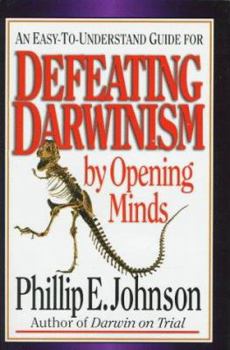Defeating Darwinism by Opening Minds
Select Format
Select Condition 
Book Overview
Phillip E. Johnson provides an easy-to-understand guide on how to effectively engage the debate over creation and evolution. This description may be from another edition of this product.
Format:Hardcover
Language:English
ISBN:0830813624
ISBN13:9780830813629
Release Date:January 1997
Publisher:InterVarsity Press
Length:131 Pages
Weight:0.75 lbs.
Dimensions:0.8" x 5.8" x 8.6"
Customer Reviews
3 ratings
On the Button
Published by Thriftbooks.com User , 18 years ago
At the heart of this book Johnson seems to be making one very basic point: Darwinism is a religion, NOT science. Now that's pretty strong stuff - inflamatory even. So consider this comment by Richard Dawkins made, not in the heat of a debate but in the course of an ordinary interview for one of the UK TV listings magazines: "Thanks to science we now have such an exciting grasp of the answers to such [profound] questions, it's a kind of blasphemy not to embrace them." Radio Times, London, 7-13 January 2006. Page 27. (We aren't told what "profound questions" Dawkins has in mind.) This is precisely the kind of materialist argument (Johnson apparently regards "materialism", "naturalism" and "Darwinism" as being more or less synonymous) that Johnson is addressing in his book rather than evolution as such. So what chance does Johnson have of making his point? Going by the reviews on this page - not a lot. And for one very simple reason that was illustrated by an incident that happened to me whilst I was reading this book on the train coming home from work. Seeing the title of the book an elderly gentleman in the seat opposite waited till the train was close to his station, then made a series of comments and promptly exited before I had a chance to reply (had I wanted to). As far as I could make out, without having any more knowledge about the book than it's title the elderly gentleman was able to tell, without a shadow of a doubt, that: - The book was ignorant rubbish - I must be some kind of religious nut for reading it - What I need to sort me out is a really good exposition on evolution such as the one he hopes to get published later this year (a bit like the lesbian who only needs an hour with James Bond to convert her to lifelong heterosexuality!) 1. Given that Johnson is dealing with matters philosophical rather than science itself, and that Ultra Neo-Darwinist Richard Dawkins has made it so abundantly clear that his own evangelicalism is indeed quasi-religious (Dawkins - described as "today's most influential evolutionary biologist" - makes numerous appearances throughout the book), it seems that Johnson is neither ignorant nor talking rubbish but is addressing a real situation. 2. Since when does one have to be a religious nut in order to question the status quo? And isn't it worrying that so many people nowadays have been brainwashed into believing that evolution is so sacrosanct that it can only be discussed by those who agree with the establishment view? As Johnson points out, we have reached a point in history - in the US, at least - where the unthinkable has not only become possible but has become a fact. "Suppose Mr. Cates had enough influence and lung power to railroad through the State Legislature a law that only Darwin should be taught in the schools!" In 1955, when Henry Drummond first made that suggestion to Matthew Harrison Brady on the opening night of the play "Inherit the Wind", it probably seemed too far fetch
A great critique on a stagnant field of science
Published by Thriftbooks.com User , 25 years ago
This book is a great "down to earth" summary of the problems of Neo-Darwinism. Showing that there is no evidence for (macro)evolution , but overwhelming evidence for Intellegent Design. If you are not the technical type and want just a run down of his thesis, along with some other good nuggets of information, Then I recommend this book.
The Darwinian agenda
Published by Thriftbooks.com User , 25 years ago
If you've been a fan of Stephen Gould's, as I was for many years, you've noticed from time to time little -- ahem -- difficulties in his easy, engaging arguments and analogies. Gosh, you said to yourself, I didn't quite see the transition there but that's just me, surely. After all, it *had* to be this way, didn't it? I mean, everything came out of somewhere to here, right? Like, Darwinism's not brain surgery. Well, Phillip Johnson argues that it is. Darwinism is a device for grounding materialism in the culture such that any objection to it can be reflexively dismissed as "fundamentalist" or an "attack on science" conducted by "lawyers" or "Christians". And, he further argues, the trick is done with smoke and mirrors, the sort of dazzle that professors of law like Johnson are skilled in detecting and tracking. Oddly enough, scientists are not very good at this sort of thing (few of us are these days), and only a couple seem worried over all these rhetorical leaps across chasms of missing data to dogma. Darwinism, like Marxism and Freudian psychology, is arguably a failed attempt to account for ourselves *in spite* of what we know. This book is an eye-opener: if it hadn't been written especially for Christians, I'd like to see it everywhere a high school kid might pick it up. It's almost as important to keep children from worshipping false gods as it is to set them looking for the true.







